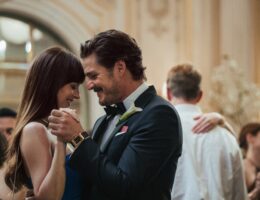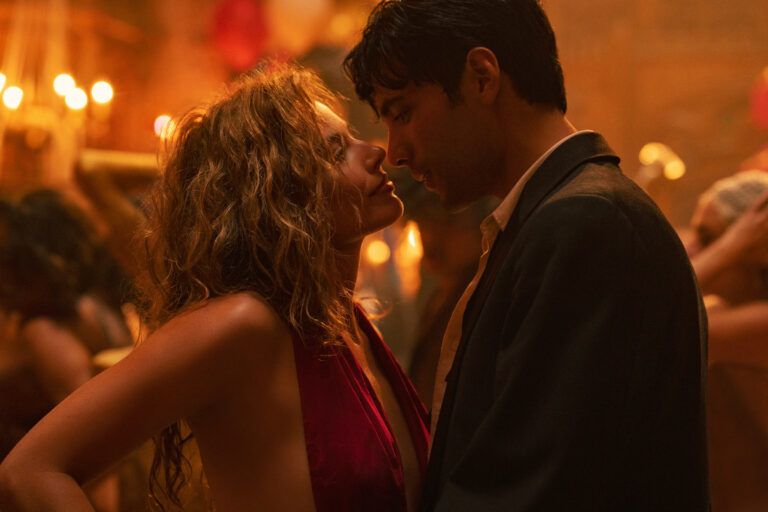Babylon (2022 | USA | 188 minutes | Damien Chazelle)
After months of hype, speculation, and some degree of mystery, Damien Chazelle’s latest — a sprawling and skeptical star-studded history of Old Hollywood — is smashing into theaters just before the calendar hits 2023. Tony, Morgen, and Josh all made it into a sneak preview at SIFF’s Egyptian Theater, ostensibly the last standing of Seattle’s great movie palaces, with a full house of film fanatics. Afterward, we spent a few days debriefing on the experience and our feelings about the three hour epic.
Three hours, multiple protagonists, decades of history. Anyone want to try for a plot synopsis?
Tony: Damien Chazelle’s latest movie is a staggeringly ambitious, multi-tiered melodrama that follows several disparate characters amidst Hollywood’s transition from silent movies to talkies: Jack Conrad (Brad Pitt), a silent-screen idol riding the changes and attempting to stay relevant; Nellie LeRoy (Margot Robbie), a salty-tongued actress who takes silent-era Hollywood by storm; Manny Torres (Diego Calva), whose drive and ambition lead to him rising in the ranks of Hollywood’s studio executives; and Sidney Palmer (Jovan Adepo), a black musician whose success as a screen star could come at the cost of his humanity. Very much interwoven with this huge technological shift is the extended high that was the late 1920s, followed by the Wall Street Crash that ushered in The Great Depression.
Josh: Lest we make this sound too highbrow, it is a film that includes car chases, explosive elephant excrement, orgies, projectile vomit, freak shows, bloody injuries, and mountains upon mountains of hard drugs.
Morgen: And don’t forget the snake fight.
Josh: Hey, no snake fight spoilers! For a three hour epic that tracks film history across a decade through the lives of three rising strivers and one aging idol, Chazelle barely gives us a chance to be bored, let alone to catch our breath. The frame is always full of something to look at, whether it be the debauched bacchanalia of the opening party sequence, the magical chaos of a working silent-era film production, the artisans toiling to incorporate new technology, or all of the glittering celebrities congregating at yet another see-and-be-seen affair.
Morgen: For the first thirty minutes I barely caught my breath. The uproarious party that kicked off the film was dazzling indeed and I didn’t know where to look, but it didn’t matter because everything was eye-candy. There were only a few moments in that time that slowed down enough to feel normal, and then off we went to the races yet again.
Tony: This is, indeed, one of the most breathlessly paced three-hour movies I’ve ever seen, and I can’t see anyone not giving into Babylon’s cornucopia of audio-visual dazzle in the temple of an actual theater.
Josh: From the starring trio to some very strong supporting roles and even a handful of utterly deranged cameos, he juggles a stacked cast into one where everyone gets a moment in the limelight. Its manic energy has the feeling of a director building an airplane while also setting it on fire somewhere over Kansas on a trans-continental flight, and still managing to land the thing, sputtering, partially intact, and with an sensory overload of film history and a jazz soundtrack (from regular collaborator Justin Hurwitz) that slaps you into exiting the theater with a dumb grin on your face.
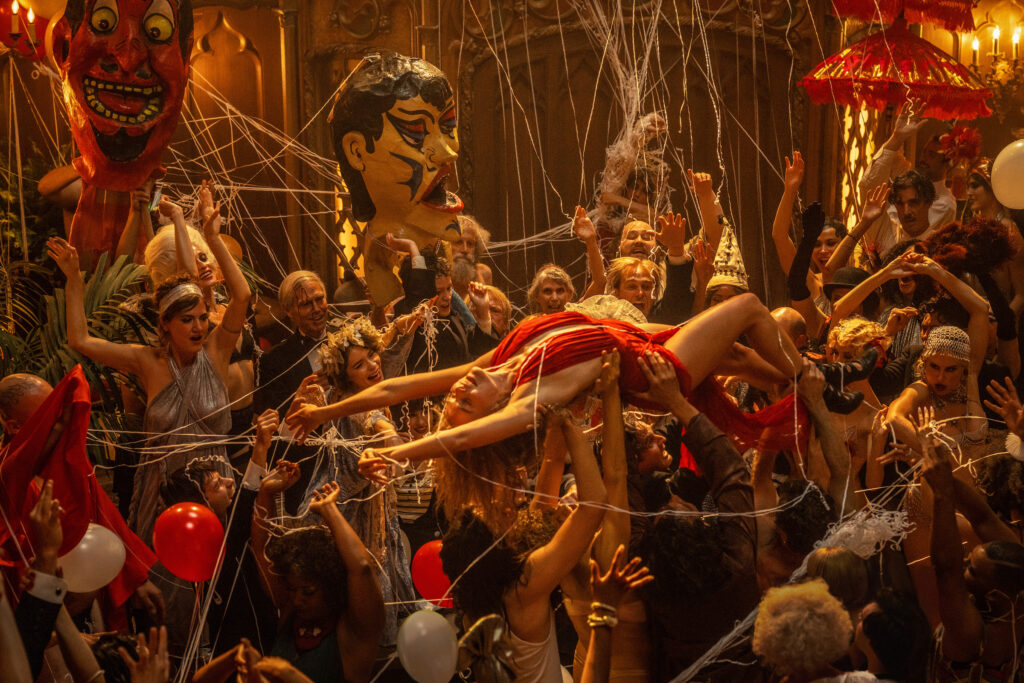
Big picture reactions?
Tony: In an age where most films are focus-grouped and homogenized to hell and back, Damien Chazelle manages to make movies that feel, for better or for worse, like the work of an auteur. Babylon isn’t nearly as profound as it thinks it is, but I’ll take a deeply-flawed swing for the fences over most of what passes for big-budget Hollywood blockbusters in this devalued age. And for all its flaws, it remains a wildly entertaining showbiz epic that moves like a shot.
Josh: Damien Chazelle has always made movies about people who throw themselves into their work, at the expense of a fuller, more balanced life that they have no idea how to live. I think that sometimes these get interpreted as simple love letters (La La Land), bland celebrations of greatness (the wildly underappreciated First Man), or triumphs over insane taskmasters (Whiplash). Here, though, you get the sense that he wants no mistakes made in the interpretation and stretches the film into a third hour to underline and put in bold type that, maybe, just maybe there’s a darker side to relying on a career to be the only thing.
Tony: Quintessentially auteur of the guy…
Morgen: This was the first of two 3+ hour movies I saw in the theater recently, and unlike the other, I can’t imagine it being any shorter. Even as I was enraptured by the Lord of the Rings films, I still remember wondering how much longer I had before it was over, but Babylon had me engrossed from beginning to end. Maybe it was the pace that had me in its grip or the emotional pull the lead storylines had on me, but it was a joy to watch every minute even if it had its foibles.
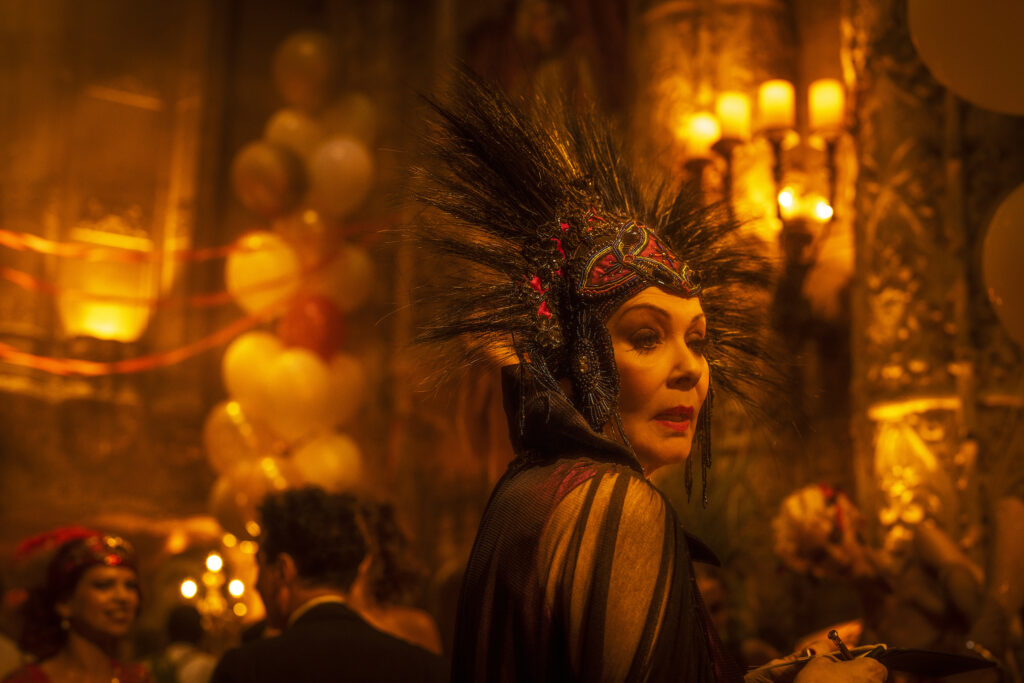
Hollywood History in Three Acts
Romanticizing the silent era mayhem and magic
Josh: If Babylon doesn’t grab you by the lapels before the opening title smashes onto the screen, you might as well pack up your popcorn and leave right away.
Tony: Chazelle’s evolved into one hell of a visual stylist, and he delivers bang for the buck like no one’s business. Babylon’s opening reel has to stand as one of the year’s best. Between Manny’s struggle with an elephant, and those Bacchanalian Hollywood parties, captured by cinematographer Linus Sandgren’s succulent crane shots, Chazelle and company have completely pulled all the stops visually.
Josh: For me, the opening sequence, in which a few dedicated workers toil to bring an unexpecting elephant over a mountain rivaled last year’s most dazzling Hollywood Hills driving sequence (Paul Thomas Anderson’s Licorice Pizza). This one ends far more messily, cleans itself up and dives into a 1926 Bel Aire, where a party invite is the most valuable currency in the realm. When we meet Manny (Diego Calva), he’s a jack-of-all-trades fixer, who easily slides from circus animal transportation into a monkey suit, a tuxedoed calm in the midst of the chaotic, drugged, revelry of a Hollywood party. Chazelle flexes his phenomenal ability to dive into a crowd with an opening party sequence that never lets up as it dips and dives through manic dance sequences, literal party crashers, and backroom depravities. But the razzle dazzle isn’t all empty calories. We get the state of play in the film business and are introduced to all of our key players and their place in the film ecosystem in fifteen glorious minutes of revelry.
Tony: It’s a brilliant bit of purely visual exposition and straps the audience in for what turns out to be one hell of a ride.
Josh: As the hooks in his familiar motif of sad broken big dreamers, Diego Calva’s a welcome surprise as the nucleus of this sprawling story of Hollywood trajectories. Along with Manny at the invisible center of the party, we get Margot Robbie as Nellie, unfortunately reprising that Harley Quinn jersey accent, and see her star being born through the happenstance of pure charisma and someone else’s bad fortune. Finally, as the most famous man in the world, albeit on a plateau rather than a rocketship, Brad Pitt rolls into the party, out of yet another marriage, and establishes himself as one of the good ones within a few efficient minutes of conversation and consolation. On gets the sense that the role of a superstar on the precipice of confronting his own fading glory and imagining how to age gracefully might hit close to home for Pitt.
Tony: The vast majority of Babylon’s ensemble nails it. I have to concur regarding Calva’s work as Manny. The camera loves him, and he anchors the movie famously. Kudos to Chazelle for putting this relative unknown at the center of his magnum opus.
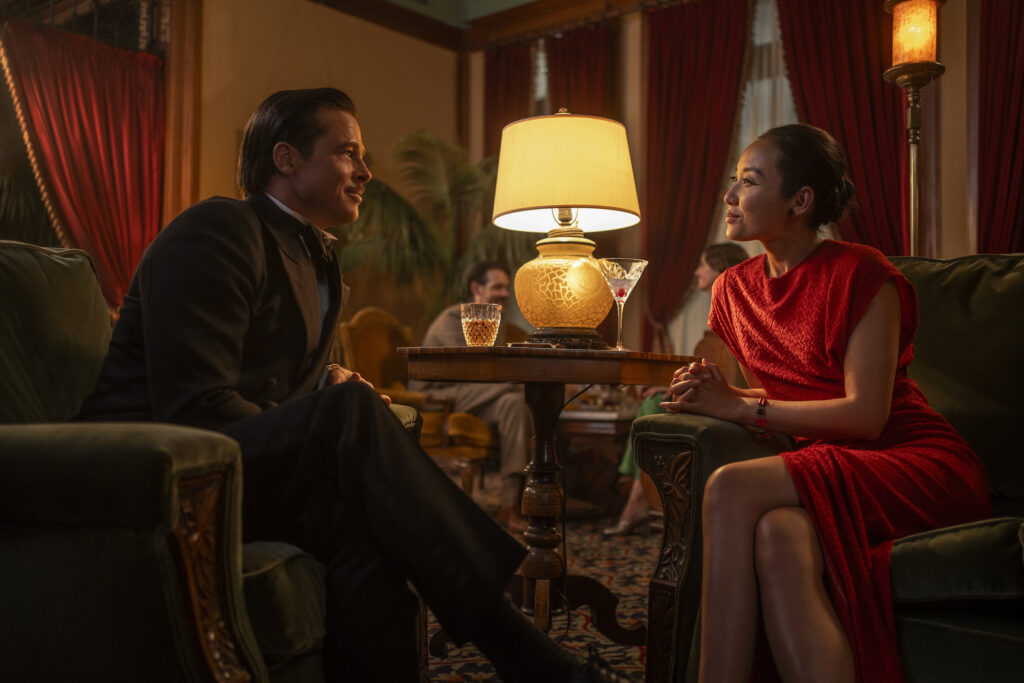
Morgen: Brad Pitt, along with Robbie and Calva, were brilliant casting choices. It hasn’t escaped my attention that as Pitt’s boyish charm and good looks have faded, his ability to capture attention and command the moment has only gotten stronger.
Tony: And Brad Pitt has been on a hell of a roll of late: His Jack Conrad is shaping up to be my favorite Pitt performance ever. As you noted Josh, Pitt surely saw some kindred spirituality between him and the character. Jack Conrad is also a composite of a few Hollywood leading men in the ‘20s and ‘30s whose trajectories and personae paralleled Pitt’s in an almost eerie way. Back in the day, guys like Gary Cooper, Clark Gable, and John Wayne started out fitting the right mold at the right time, had their limits tested early on in ridiculously inappropriate period roles (Gary Cooper played Marco Polo in a flop Warner Brothers epic about Genghis Khan, Pitt got his clock cleaned in a couple of period roles that just didn’t fit him), then they figured out what worked for them. And like those forebears, Pitt has gotten better with time and perseverance. The Brad Pitt of 20 years ago could never have played a role with this much heft emotionally, and with so much going on underneath his ambling exterior. If he doesn’t net another acting Oscar for this, it’ll only be because the Academy’s pretty stingy about giving the same actor kudos twice in rapid succession. Cooper, Gable, and Wayne likewise got Oscar nods/wins when they were close to Pitt’s age in their respective eras, so it tracks.
Josh:
Nevertheless I appreciate how much Chazelle is interested in the whole motion picture ecosystem, so at this party we also catch glimpses of other key players like Jean Smart’s impossibly glamorous gossip columnist, Sidney Palmer (Jovan Adepo) as a day player in the band, always grumbling about who’s flat or sharp; and Li Jun Li as Lady Fay Zhu, a sensual performer whose works have retreated behind the camera even as she remains central to the social milieu.
Tony: Li’s Lady Fay Zhu–based at least partially on Asian early-Hollywood actress Anna May Wong–raises the temperature a good 20 degrees in that first musical number. Hell, when you’ve got Flea from the Red Hot Chili Peppers delivering a funny, real-feeling performance as a grouchy studio exec, you’ve done an awful lot right, casting-wise.
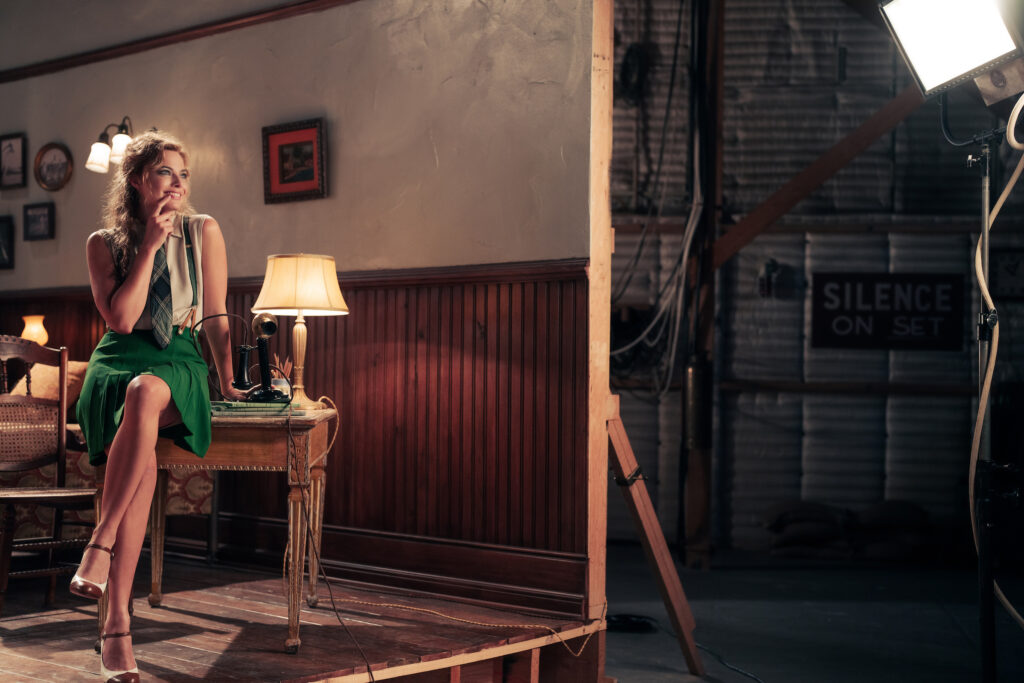
Josh: Of this core trio, Robbie comes in at something of a disadvantage since the “Stars ain’t made, they’re born” role of Nellie LeRoy was originally slated to be a reunion between Chazelle and Emma Stone, but scheduling conflicts got in the way. There’s no question that the camera loves Margot, but the role of outsider crashing the party was always going to be the toughest to nail.
Tony: Ironically (and I know I’m in the minority on this), the one sore point among the performances for me was Margot Robbie. She delivers a Bravura Acting Showcase with a capital BAS, and what she does, she does well. But of all the actors in the movie, she felt like the most anachronistic by a long stretch. Every other thing I’ve seen her in up to this point, she’s consistently been the highlight for me, and I’ll go to bat for her being one of the great movie stars of her generation–srsly. But I felt like she was delivering Harley Quinn leftovers basted in liquor and cocaine–schtick, instead of a performance. Yes, this is a splashy fairy tale with only tenuous connections to early-20th century reality. But every other performance in Babylon felt/feels wonderfully of the time, in the best, not-stodgy way. And whenever Nellie/Robbie showed up, it completely yanked me out of the immersive world Chazelle and team worked so hard to cultivate.
Morgen: I have a slightly more favorable view of Robbie, but I get where you’re going Tony. I don’t know if this was how she created her character or if it was a writer’s room decision, but it felt like the character she was playing was a little too garish for the time. Pulling up her knickers and using rude words in silent film seems disingenuous. Maybe my limited view of films in that time period are stilted but would a woman being so crass become such a huge Hollywood star? I know they made a point of trying to improve her image later in the film to be a more serious actress, but even so would she have made it that far?
Josh: That’s an interesting point, I think that he’s being purposefully anachronistic and loose with the details to make the film fly for a contemporary audience, but it does induce some sort of dissonance.
Of course, that opening party is just a gussied up reflection of what life was like on a silent era film set, or at least Chazelle’s romanticized view of one. When Manny and Nellie simultaneously achieve their dream of setting foot on a set, you understand why everyone talks about this carnivalesque scene of overlapping shoots, craft services, and site of epic sequences as the most magical place on earth, all chaos, pills, and explosive creativity. Another remarkable aspect of Chazelle’s approach is his interest in not just his stars, but in all the “little people” whose less glamorous work keeps the whole operation going. Even in small glimpses – director finding her new star, tradesmen and costume technicians, day players waiting for the star to arrive, cinematographers fretting about losing the light, and musicians stumbling home to shabby apartments still aglow with their versions of success – he reminds us that all of these people matter. It’s easy to believe that amid that churning mayhem, an actress who can cry on cue and a kid who can move heaven and earth so a big director doesn’t lose his magic hour light could be catapulted onto a trajectory of success on the merits of a good day’s work.
Tony: I love most of the characters in Babylon’s periphery so much that I could easily envision at least five of them meriting subplots of their own. And I’d be happy to follow ‘em all. Babylon’s one of those rare movies where you almost ache for another 30 minutes of run time, just to get to know some of these background characters better. But I would not be surprised if such a treasure trove will surface via some sort of extended Director’s Cut.
Morgen: I second this Tony, I say we campaign for a spin-off. Where can we get Chazelle’s email?
Josh: Totally, we need to pitch this! I really enjoyed this as an epic movie experience, but could also see how there’s more than enough material in the so-called side characters that each chapter could’ve supported a season of prestige television. They must’ve cracked opened a vault of dragon’s gold for the spare-no-expense production design; it’s a shame not to have kept the sets around for an extended universe. Sidney’s story of a rise from party performer to marquee idol in his own right was often pushed into the periphery, disappointing given Chazelle’s jazz-ophilia but maybe not surprising as a reflection for Hollywood’s fickle priorities.
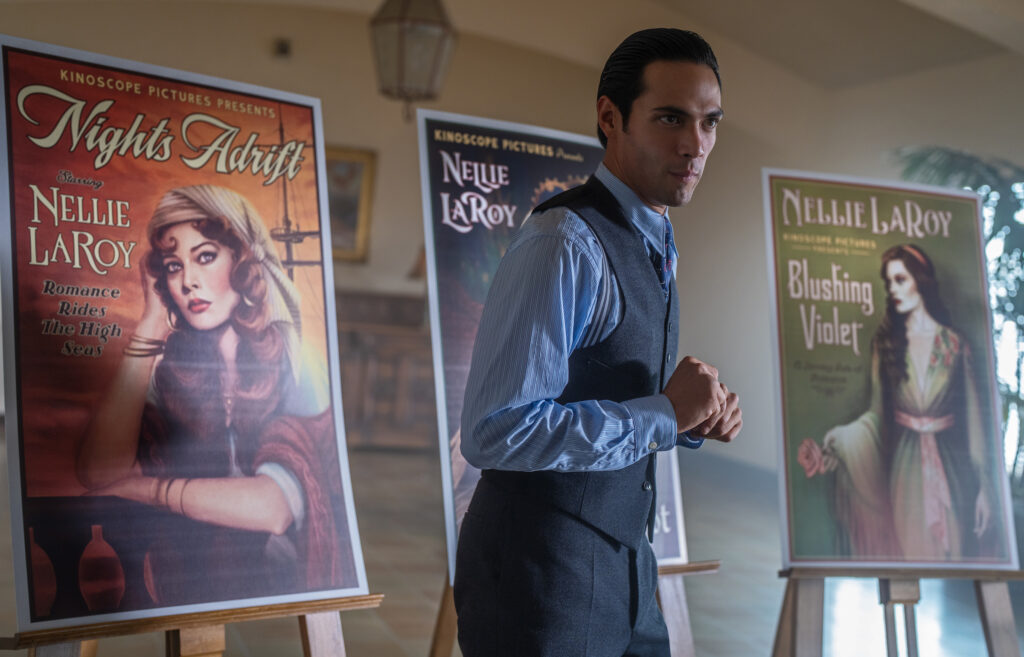
The talkies and the price of success
Josh: The movie does a pretty cruel trick by crashing directly from from the wonder of talking pictures, via a rapturous premiere of The Jazz Singer, to the oppressive contrast between the wide open cauldron of silent age creativity to the oppressive soundstages of talking pictures, held prisoner to the technology that promised vitality.
Tony: That entire scene stands as one of my favorites in the movie. It’s equal parts comic as hell and brain-splittingly unnerving, and yet another very elegant reinforcement of Chazelle’s knack for the minutiae of filmmaking, and each of the cogs that make the machine go.
Morgen: Having been on a film set or two myself, this absolutely killed me. With equal parts reality and over-the-top absurdity I couldn’t stop laughing and crying at the same time. When he was stuck in the hot camera booth, I could feel something building up and just waited for it to explode. Insanity that skirts the edge of reality just enough so you wonder “is it really like that or does it just feel that way?” Both.
Josh: It’s an amazing depiction of frustrations and successfully ushers us into the new world of the studio system, with each of our characters adjusting to the new landscape, be it in the form of Manny’s ascent to slicked-back studio exec, Sidney becoming a hot commodity for the audience’s changing tastes, and Nellie and Jack finding themselves uncertain about how to translate silent film magnetism into talkie stardom. As the parties get more buttoned up and closer to the company town, the excesses of the past start to look like sore thumbs to the community that’s trying to grow up. Suddenly entourages of drunken college students and insane potentially patricidal snake fights just aren’t as cute anymore for an industry trying to take itself seriously.
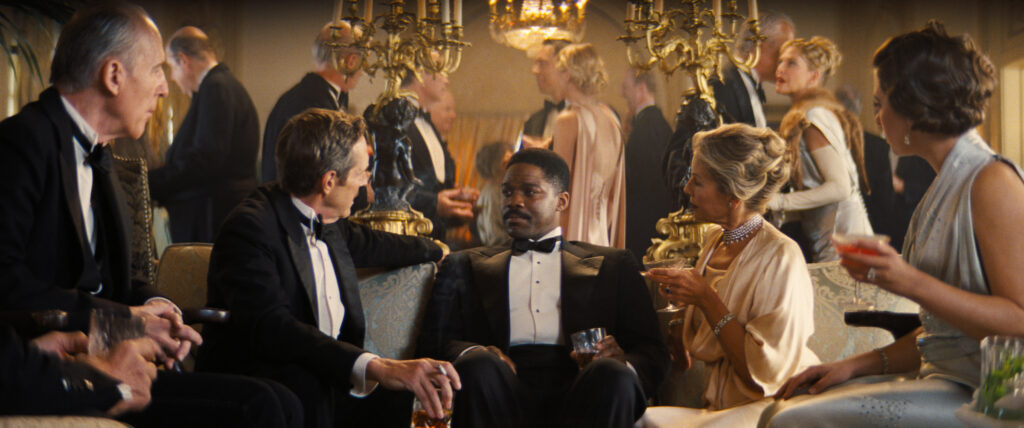
The self-imposed prison of work at the expense of a life
Josh: The third act definitely sags, but there’s no question that it’s on purpose and from my point of view it worked. It’s as if we’ve had our fun and Chazelle refuses to allow us to allow the consequences to fall into forgiving soft focus.
Morgen: Brad Pitt, in particular, embodies the slow painful decline. Despite wasting away his days on drugs, wives and alcohol, we can’t help but feel for him as he realizes his career can’t sustain changes the industry is undergoing. When an audience laughed at his performance as he stalked the back of the theater donning a trenchcoat and hat, the pain on his face hit you right in the gut.
Josh: Careers dry up, fallen stars get in over their heads, problematic habits that could be outrun as an ingénue eventually catch up with reality, and the price of admission for celebrity becomes a bridge too far. Chazelle stays with each of these characters as they either lean into the skid or make principled exits. Surprisingly only the frivolous gossip reporter played by the always Jean Smart always in Old Hollywood Glamor costumes gets the magical monologue to try to put the highs and lows into context.
Tony: In a movie full of strong performances, Smart’s definitely got the Supporting Actress Oscar-worthy magical monologue of the year here, and she’s more than equal to it.
Morgen: She’s the hidden gem among all the gleaming diamonds.
Josh: Of all the overstuffed plot points, even the unrequited love story of Manny pining after Nellie has its place for being brutally asymmetric in that he obviously is smitten with her despite being fully aware of why she’s just not that into him. That particular arc, complete with an unhinged descent into a hidden Los Angeles hellscape with an unhinged cameo, reads as a statement against the dangers of attachments, a familiar lingering Chazelle theme.
Tony: Chazelle isn’t exactly a fount of nuance, for sure. But his operatic approach undeniably serves the movie well, overall. And I do love that he’s left enough footprints from real old Hollywood that sting with relevance today. The portrayals (and tacit acceptance of) the women, folks of color, and LGBTQ people reflect, quite resonantly, how Hollywood really dealt with, and accepted, outcasts and misfits at the time, as they united primarily in their drive to express themselves.
Morgen: I think the desperation of Manny in the third act to find a way out, to find happiness, proves to us that he was never meant to be a part of Hollywood even if he did want a piece of it. His character was the catalyst in pulling us out of the frivolity and joyous insanity of being a film star and into the reality of life and what’s important in the end.
Tony: All told, for all its flaws, I’m glad I saw Babylon in a packed screening in a movie palace. This is one movie that’ll play with general audiences just as well, assuming they give it a chance. It’s built for the theatrical experience, and its impact will be dulled when it gets to streaming/home video. Get thee to a theater, folks. It’s worth the admission, and the ride.
Josh: Oh, for sure. That preview screening was one of the most packed houses I’ve encountered in Seattle and even though the promised special guests didn’t show, the excitement of a preview screening with complimentary champagne primed the audience for a good time. I did most of SIFF virtually this year, so it was a complete delight to see the Egyptian so full of film enthusiasts.
Morgen: Yes, I am so glad I was in a theater full of eager watchers. The energy as everyone laughed and the tension of the dead silence near the end really made the experience more than just watching a movie. I also noticed Tony was literally on the edge of his seat more than once, now that’s a sign of a good film.
Babylon arrives in theaters on December 23, including a run at the SIFF Egyptian.
All images courtesy Paramount Pictures.

